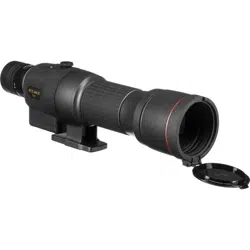Loading ...
Loading ...
Loading ...

6
En
Fr
Es
Pt
Ru
Se
Nl
De
It
Dk
Pl
Hu
Cz
Fi
No
Ro
7
En
Fr
Es
Pt
Ru
Se
Nl
De
It
Dk
Pl
Hu
Cz
Fi
No
Ro
For your safety
Do not leave this product
in a car on a hot or sunny
day, or near heat-generating
equipment.
Doing so may have a bad
effect on internal parts, or
may cause a fire.
Do not use organic solvents
such as alcohol for cleaning
the main body.
Keep the plastic bag used to
wrap this product or other
small parts out of reach of
children.
Prevent children from
putting caps or rubber
eyecups into their mouths.
If children swallow such parts,
consult a doctor immediately.
Handle moving parts with
care.
Angle-type Fieldscope can
be rotated when mounted
on a tripod. Be careful not to
pinch your fingers between
the battery holder and tripod
mount when rotating the
body.
Do not impact Fieldscope by
dropping or hitting.
This may cause malfunction
because this product is a
precision electronic device
(vibration reduction function
equipped). Any failure caused
by such handling is not
covered by the warranty.
Avoid rain, water splashes,
sand and mud.
This product is waterproof
(they body/eyepiece joint and
the body/battery holder joint
are water-resistant), however,
avoid rain, water splashes,
sand and mud.
Do not operate focusing ring
if exposed to water or rain.
Avoid sudden temperature
changes.
If the Fieldscope is exposed to
sudden temperature changes,
water condensation may
occur on lens surfaces.
If an inflammation of the skin
occurs, consult a doctor.
If using the rubber eyecups
for a long period of time,
some people may suffer
skin inflammation. If any
symptoms occur, consult a
doctor immediately.
DANGER
(for alkaline and lithium batteries)
If liquid from a damaged
battery enters the eyes,
rinse immediately with clean
water, then consult a doctor.
Failure to do this may
negatively affect or damage
your eyes.
WARNING
(for alkaline and lithium batteries)
Do not peel off the outer
tube, or scratch.
It may cause liquid to leak,
overheating or explosion.
Do not expose the battery to
flame or excessive heat.
It may cause liquid to leak,
overheating or explosion.
Do not combine old and
new batteries or batteries of
different makes or types.
It may cause liquid to leak,
overheating or explosion.
Do not short or disassemble a
battery.
It may cause liquid to leak,
overheating or explosion.
Observe warning and
cautions written on batteries.
Failure to do so may cause
liquid to leak, overheating or
explosion.
Use only batteries approved
for use with this product
(refer to specifications).
Failure to do so may cause
liquid to leak, overheating or
explosion.
Keep batteries out of reach
of children.
Particular care should be
taken to prevent infants from
putting a battery or other
small parts into their mouths.
If they swallow such parts,
consult a doctor immediately.
Insert batteries in the correct
orientation.
Failure to do this may cause
liquid to leak, overheating or
explosion.
Do not immerse in or expose
to water.
Failure to observe this
may cause liquid to leak,
overheating or explosion.
Do not charge batteries
other than rechargeable
batteries.Failure to observe
this may cause liquid to leak,
overheating or explosion.
WARNING
(for alkaline batteries)
Remove batteries
immediately when no charge
remains.
Failure to observe this
may cause liquid to leak,
overheating or explosion.
DANGER
[for Ni-MH (nickel metal hydride) batteries]
When charging, use only the
specified charger and charge
the batteries four at a time.
Failure to observe this
may cause liquid to leak,
overheating or explosion.
Do not expose batteries to
flame or excessive heat.
Failure to observe this
may cause liquid to leak,
overheating or explosion.
Insert batteries in the correct
orientation.
Failure to do this may cause
liquid to leak, overheating or
explosion.
Do not short or disassemble a
battery.
Failure to observe this
may cause liquid to leak,
overheating or explosion.
Do not transport or store
batteries with metal objects
such as necklaces or hairpins.
Failure to observe this
may cause liquid to leak,
overheating or explosion.
Do not combine old and
new batteries or batteries of
different makes or types.
Failure to observe this
may cause liquid to leak,
overheating or explosion.
If liquid from a damaged
battery enters the eyes,
rinse immediately with clean
water, then consult a doctor.
Failure to do this may
negatively affect or damage
your eyes.
When disposing of batteries,
isolate the contact points
with sealing tape.
Contact with other metal may
cause
overheating, explosion
or fire. Dispose of batteries
according to your local area
regulations.
If liquid from a damaged
battery comes into contact
with clothing or skin, rinse
immediately with plenty of
water.
Failure to observe this may
result in skin irritation.
Loading ...
Loading ...
Loading ...
